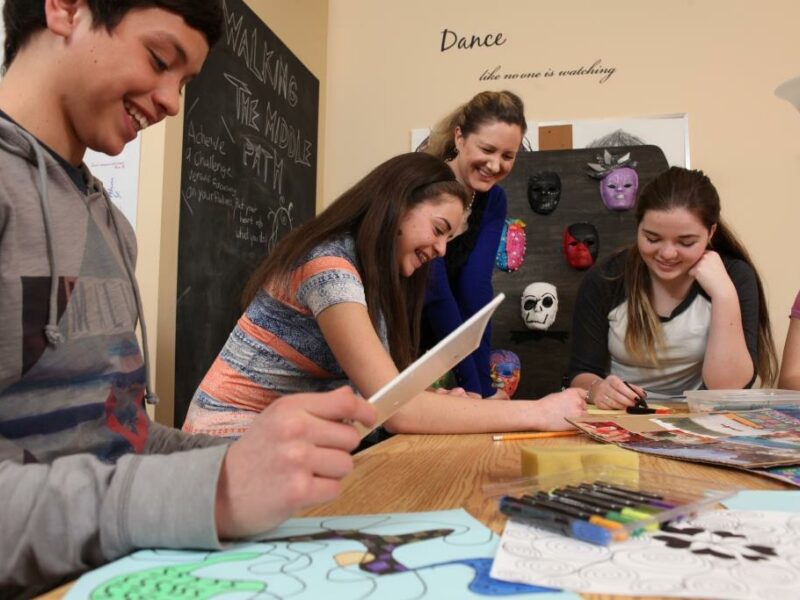Mental Health Services that Work!


Search for “anxiety” on Google and you will see many ideas for “the secret to happiness and mental well-being.” So what do you do if you suspect your child is experiencing depression, anxiety, emotion dysregulation (difficulties coping with emotions, having extreme ups and downs in feelings), or unusual temper tantrums or aggressive behaviour? This article is a brief introduction to some evidence-based mental health treatments used for common problems experienced by children and teens.
While social workers, counsellors, psychologists and family doctors can all provide mental health services, only the last two can diagnose a mental health problem. And getting the diagnosis right is very important in order to identify the right treatment. Think of a diagnosis as your starting point, the treatment approach and plan as your map guiding you to your destination of mental wellness.
Once you have the right diagnosis, it’s very important to look for a professional who uses the “evidence-based treatment” or “EBT” for the particular problem. An EBT is a program that has been shown in the research to work for a particular problem. To earn the EBT “status” these programs must demonstrate results that are better than the usual standard treatment or similarly effective to another EBT for the same problem. Below are some EBTs for some common mental health difficulties.
Anxiety[i]
Cognitive-Behaviour Therapy or “CBT” has very strong evidence that works for many different childhood anxiety disorders. It has two main parts: 1) learning how to notice and challenge unrealistic worries and 2) “graduated exposure” or slowly facing versions of your fears until you build the confidence to face your biggest fears.
Depression[ii]
CBT also has shown to work well for children and teens who experience depression. It looks a little different from CBT for anxiety. You still will work on challenging negative thoughts that are hurtful and unhelpful, but instead of exposure you’ll work more on building activities that you enjoy or make you feel proud back into your life. Sometimes medication is needed when depression is particularly severe.
Another treatment that works well for depression is manualized Interpersonal Therapy for Depression. This therapy focuses on understanding how relationships and the roles you take in them can keep depression symptoms going, as well as ways to build more emotionally healthy relationships.
In addition, physical activity has also been shown to be very helpful in reducing some depression and anxiety symptoms! You can start with just a 15 minute walk each day!
Emotion Dysregulation/Suicide Thoughts & Behaviours/Self-Harm[iii]
Dialectical Behaviour Therapy or “DBT” (I know, way too many BTs!) has been shown to help teens who have trouble coping with overwhelming feelings and may resort to forms of self-harm (e.g. cutting) in order to cope. This therapy focuses on techniques to help teens accept who they are and work towards change at the same time. It includes elements of CBT, mindfulness (techniques to focus on the present and be less critical of ourselves), relaxation strategies, and building healthier relationships.
Trauma[iv]
Experiences of trauma, be they one time (e.g., a car accident) or repeated/chronic traumas (e.g., child abuse), are most effectively treated by Trauma-Focused CBT. This therapy includes CBT skills plus techniques to cope with big feelings and processing and telling the young person’s story of trauma.
Tantrums & Aggressive Behaviours[v]
Children who struggle to follow rules and expectations and/or have aggressive outbursts are often helped by “behaviour management” or “parent skills training” approaches (and there are programs with many combinations of these names). Basically, it uses principles of “positive reinforcement” or using strategies to increase positive behaviours (e.g., following the rules) by use of praise and rewards and decreasing negative behaviours by “negative reinforcement” or not giving attention to these behaviours. This form of therapy also emphasizes often lost positive quality time with children and their parents.
Accessing Children’s Mental Health Services in Waterloo Region
If you are concerned about your child’s mental health or behaviours, a great first step is to talk to your family doctor or visit a walk-in counselling session at Front Door where an Intake Clinician will listen to your concerns, help you determine your needs, and schedule a meeting for services as appropriate.
[i] Reynolds, S., Wilson, C., Austin, J., & Hooper, L. (2012). Effects of psychotherapy for anxiety in children and adolescents: A meta-analytic review. Clinical psychology review, 32(4), 251-262.
[ii] Zhou, X., Hetrick, S. E., Cuijpers, P., Qin, B., Barth, J., Whittington, C. J., ... & Zhang, Y. (2015). Comparative efficacy and acceptability of psychotherapies for depression in children and adolescents: A systematic review and network meta‐analysis. World Psychiatry, 14(2), 207-222.
[iii] Mehlum, L., Tørmoen, A. J., Ramberg, M., Haga, E., Diep, L. M., Laberg, S., ... & Grøholt, B. (2014). Dialectical behavior therapy for adolescents with repeated suicidal and self-harming behavior: a randomized trial. Journal of the American Academy of Child & Adolescent Psychiatry, 53(10), 1082-1091.
[iv] Morina, N., Koerssen, R., & Pollet, T. V. (2016). Interventions for children and adolescents with posttraumatic stress disorder: A meta-analysis of comparative outcome studies. Clinical Psychology Review, 47, 41-54.
[v] Comer, J. S., Chow, C., Chan, P. T., Cooper-Vince, C., & Wilson, L. A. (2013). Psychosocial treatment efficacy for disruptive behavior problems in very young children: A meta-analytic examination. Journal of the American Academy of Child & Adolescent Psychiatry, 52(1), 26-36.
Instagram Feed
"I like the idea of 'collective impact.' Instead of individual organizations each working towards our own impact, Starling brought us together with other mental health service providers to pool resources and ideas for a national impact."












